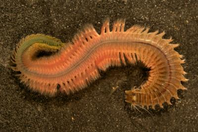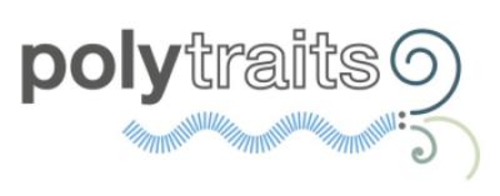
Ecosystem functioning, or the role which organisms play in an ecosystem, is becoming increasingly important in marine ecological and conservation. To facilitate such studies an international team of scientists lead by S. Faulwetter from the Hellenic Centre for Marine Research (HMRC) present the Polytraitsdatabase that aims to provide re-usable, and accessible data on marine bristle worms. The paper describing the new database was published in the innovative Biodiversity Data Journal, a pioneer in the publication of integrated biological data.
Benthic organisms participate in a number of biological processes in world water basins. Their functional diversity is an important community property demonstrating the role organisms have in the ecosystem and helping to understand how the community reacts to environmental changes. Polychaetes, or bristle worms, are marine worms famous for their peculiar shapes and often vivid coloration. More than 10,000 species are described in the class worldwide, most of which living in the shelf zone of the seas and oceans, burrowing in the sediment or swimming among the plankton.
At present, the Polytraits database contains almost 20,000 records on morphological, behavioural and reproductive characteristics of more than 1,000 species, all referenced by literature sources. All data on these engaging organisms can be freely accessed through the project website in different ways and formats, both human-readable and machine-readable. The new database presents a rich and easy to use collection, which cover morphological, reproductive and behavioural characteristics of polychaetes, as well as information on environmental preferences in an attempt to facilitate ecological research and conservation studies.
The researchers also provide a leading-edge approach to accessing, integrating and re-using the data. Through programming interfaces, the life-cycle information is automatically integrated into the Polychaetes Scratchpads, together with other data on polychaetes. Scratchpads are easy to use, adaptable, and provide powerful tools for managing biodiversity data. This taxon-centric virtual research environment allows browsing the taxonomic classification and retrieving various kinds of relevant information for each taxon, among which are also the collected biological traits.
Furthermore, the data are also accessible through Encyclopedia of Life's TraitBank which currently features over 3 million records related to more than 250 attributes for 272,720 taxa, including the Polytraits data. TraitBank serves as a provider for aggregated species trait data. All data uploaded there are archived and integrated with trait information from other sources to address issues of standardization of scientific data. This is the first complex database for marine organisms to be published in such an innovative way and demonstrates yet another example of collaboration between the data publisher Pensoft and Encyclopedia of Life.





 RSS news
RSS news Print this article
Print this article
